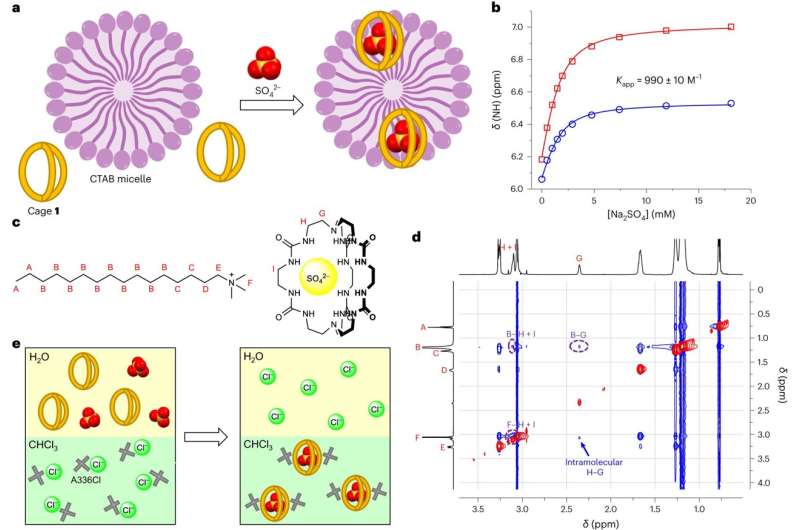This article has been reviewed according to Science X's editorial process and policies. Editors have highlighted the following attributes while ensuring the content's credibility:
fact-checked
peer-reviewed publication
trusted source
proofread
Trapping sulfate to benefit health, industry and waterways

Scientists have developed a new method to measure and remove sulfate from water, potentially leading to cleaner waterways and more effective nuclear waste treatments.
A collaborative team from The University of Queensland and Xiamen University in China has designed a cage-like molecule to trap sulfate, a naturally occurring ion, in water. The research paper is published in Nature Chemistry.
Professor Jack Clegg from UQ's School of Chemistry and Molecular Biosciences said controlling the sulfate concentration in water is a significant challenge in health, industry and environmental management.
"Sulfate is a very common and important ion," Professor Clegg said.
"In low quantities in the human body, sulfate has diverse metabolic roles such as eliminating toxins and helping drugs work effectively. But in the environment, too much sulfate can pollute drinking water and accelerate the corrosion of pipes.
"The presence of sulfate also causes problems when immobilizing radioactive wastes.
"Being able to monitor and completely remove sulfate in water has great potential across many areas."
The researchers developed a molecule that measures and traps sulfate in water with a high degree of selectivity. This 'molecular trap' can be prepared inexpensively from off-the-shelf chemicals.
Dr. Xin Wu, a former DECRA fellow at UQ now based at Xiamen University, said while there are enormous benefits from cheaply and easily measuring sulfate levels, the molecular trap's ability to capture negatively charged chemicals from water is also valuable.
"Being able to stabilize a highly negatively charged chemical such as sulfate inside a charge-neutral cavity is a remarkable feature of our molecule," Dr. Wu said.
"This mimics the function of naturally occurring sulfate-binding proteins.
"The technology could also have applications in medicine, such as helping to funnel chloride and bicarbonate ions through cell membranes to treat diseases that involve defective ion transport such as cystic fibrosis.
"This is just the beginning—we're excited to see how this fundamental science can be applied in all sorts of fields."
More information: Liuyang Jing et al, A charge-neutral organic cage selectively binds strongly hydrated sulfate anions in water, Nature Chemistry (2024). DOI: 10.1038/s41557-024-01457-5
Journal information: Nature Chemistry
Provided by University of Queensland




















